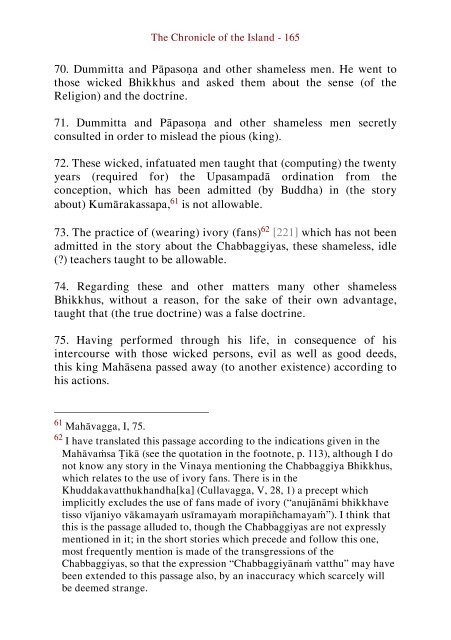Chronicle of the Island (Dīpavaṁsa)
The earliest attempt to write a Chronicle of the Sāsana and the Kings of Sri Lanka, from earliest times up to the 5th c. A.D. Translation only.
The earliest attempt to write a Chronicle of the Sāsana and the Kings of Sri Lanka, from earliest times up to the 5th c. A.D. Translation only.
Create successful ePaper yourself
Turn your PDF publications into a flip-book with our unique Google optimized e-Paper software.
The <strong>Chronicle</strong> <strong>of</strong> <strong>the</strong> <strong>Island</strong> - 165<br />
70. Dummitta and Pāpasoṇa and o<strong>the</strong>r shameless men. He went to<br />
those wicked Bhikkhus and asked <strong>the</strong>m about <strong>the</strong> sense (<strong>of</strong> <strong>the</strong><br />
Religion) and <strong>the</strong> doctrine.<br />
71. Dummitta and Pāpasoṇa and o<strong>the</strong>r shameless men secretly<br />
consulted in order to mislead <strong>the</strong> pious (king).<br />
72. These wicked, infatuated men taught that (computing) <strong>the</strong> twenty<br />
years (required for) <strong>the</strong> Upasampadā ordination from <strong>the</strong><br />
conception, which has been admitted (by Buddha) in (<strong>the</strong> story<br />
about) Kumārakassapa, 61 is not allowable.<br />
73. The practice <strong>of</strong> (wearing) ivory (fans) 62 [221] which has not been<br />
admitted in <strong>the</strong> story about <strong>the</strong> Chabbaggiyas, <strong>the</strong>se shameless, idle<br />
(?) teachers taught to be allowable.<br />
74. Regarding <strong>the</strong>se and o<strong>the</strong>r matters many o<strong>the</strong>r shameless<br />
Bhikkhus, without a reason, for <strong>the</strong> sake <strong>of</strong> <strong>the</strong>ir own advantage,<br />
taught that (<strong>the</strong> true doctrine) was a false doctrine.<br />
75. Having performed through his life, in consequence <strong>of</strong> his<br />
intercourse with those wicked persons, evil as well as good deeds,<br />
this king Mahāsena passed away (to ano<strong>the</strong>r existence) according to<br />
his actions.<br />
61 Mahāvagga, I, 75.<br />
62 I have translated this passage according to <strong>the</strong> indications given in <strong>the</strong><br />
Mahāvaṁsa Ṭikā (see <strong>the</strong> quotation in <strong>the</strong> footnote, p. 113), although I do<br />
not know any story in <strong>the</strong> Vinaya mentioning <strong>the</strong> Chabbaggiya Bhikkhus,<br />
which relates to <strong>the</strong> use <strong>of</strong> ivory fans. There is in <strong>the</strong><br />
Khuddakavatthukhandha[ka] (Cullavagga, V, 28, 1) a precept which<br />
implicitly excludes <strong>the</strong> use <strong>of</strong> fans made <strong>of</strong> ivory (“anujānāmi bhikkhave<br />
tisso vījaniyo vākamayaṁ usīramayaṁ morapiñchamayaṁ”). I think that<br />
this is <strong>the</strong> passage alluded to, though <strong>the</strong> Chabbaggiyas are not expressly<br />
mentioned in it; in <strong>the</strong> short stories which precede and follow this one,<br />
most frequently mention is made <strong>of</strong> <strong>the</strong> transgressions <strong>of</strong> <strong>the</strong><br />
Chabbaggiyas, so that <strong>the</strong> expression “Chabbaggiyānaṁ vatthu” may have<br />
been extended to this passage also, by an inaccuracy which scarcely will<br />
be deemed strange.

















